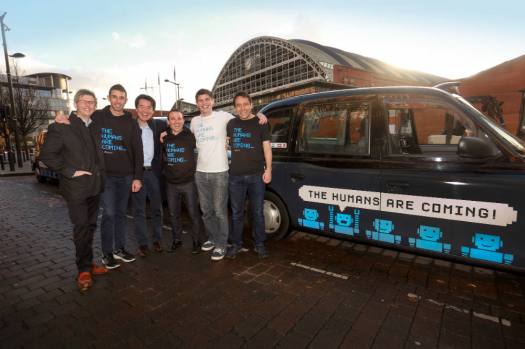Meet the team: 8 questions with Wakelet’s UX/UI designer
Ever wondered who decides the way Wakelet and our new features look? We caught up with Rick Butterworth, Wakelet’s UX/UI designer, to find out more
1. How did you become a UX/UI designer at Wakelet?
‘While my A levels and time at university in Salford (where I studied a BSc in Aviation Technology with Pilot Studies) helped to develop my creativity and learn to challenge myself, my design and coding skills are mostly self-taught. I learned to code while creating my first app for Windows, mostly through online tutorials, as well as taking inspiration from other sites and trying to replicate the aspects I liked. I quickly realized that it was the look and feel of websites that really piqued my interest.
‘Fast-forward to 2010 and I was working as an airport consultant. While travelling home from a job in Croatia, via Brussels, I happened to get chatting to Wakelet’s founder and CEO, Jamil, in the boarding queue. I think it was a joke about my ticket flashing up red in the machines that kick-started the conversation! Jam was working at Airbus at the time and we bonded over our shared love of all things aviation. We exchanged business cards at the baggage carousel and later connected on LinkedIn.
‘In the months that followed I started my own web design company. Jam saw this on LinkedIn and got in touch about this amazing idea he’d had. We met up to talk about it and I ended up joining him as the company’s designer. I’ve been at Wakelet ever since!’
2. What are essential skills for a UX/UI designer to have?
‘Creativity is the most important thing; you need to have a vision and then be able to work out how to execute it. An understanding of design trends and the best practices for different devices helps to inform your work, and it’s essential that you pay attention to consistency and detail. Being able to understand users and their behavior is also really important and that understanding helps you be more objective – you can’t let personal preferences get in the way.’
3. How does UX/UI design support start-ups?
‘The design of your site is your first impression; it’s the first thing users will notice when they land on the homepage and it’ll inform how they feel about the platform immediately. And if you get it wrong, you’ll hear about it! Design not only helps start-ups create something that’s aesthetically-pleasing and presentable but it also gives the brand a recognizable identity. UX/UI design more specifically can tell the company more about their users, how they interact with the platform, and the user journeys that work the best. It’s constantly changing though, we’re always improving and iterating.’

4.What’s been your most memorable moment as Wakelet’s UX/UI designer?
‘There have been so many memorable moments over the years that it’s tough to pinpoint just one. Our first investment was a big one, as well as when we took over the taxis in Manchester – it was amazing to see our robots all over the city! More recently, it’s been seeing the way our user numbers have grown and having a community that loves what we do and is always shouting about us. It’s crazy to think about how far we’ve come.’
5. What challenges have you faced?
‘When you work at a start-up, every day is a learning curve. You really have to learn as you go along, learn by doing, and there’s no head of design with 25 years’ experience to lean on. It’s a bit of a venture into the unknown, but that’s what makes it exciting too. And you always need to move quickly, of course!’
6. What does your role entail?
‘The UX/UI designer role is quite diverse. It starts with user research and then designing user journeys with wireframes to prove the concept. I have to ensure everything is spec’d out for web, mobile and our apps, and then test the designs and flows that we implement. At the same time, I oversee our general branding, including our marketing materials.’
7. What advice would you give to an aspiring UX/UI designer?
‘I think the thing to remember is that inspiration is everywhere. Learn from what’s around you, even if it’s not in your field. Look at video games, apps, TV streaming services – you can learn a lot from their user journeys. Always question what they do and why they do it, and don’t forget that just because a company is big or established that doesn’t mean it’s always right. Challenge everything.’
8. How do you use Wakelet?
‘I use Wakelet in both my professional and personal life. It’s a great place to save my professional development materials; I save inspiration, articles, and tutorials. I also create collections centred on my interests, whether it’s watches I’d love to own or the best ice hockey goals this season! I’m also dyslexic, so I’ve created a few collections that aim to help others understand dyslexia better.’
Follow Rick on Wakelet @rick

